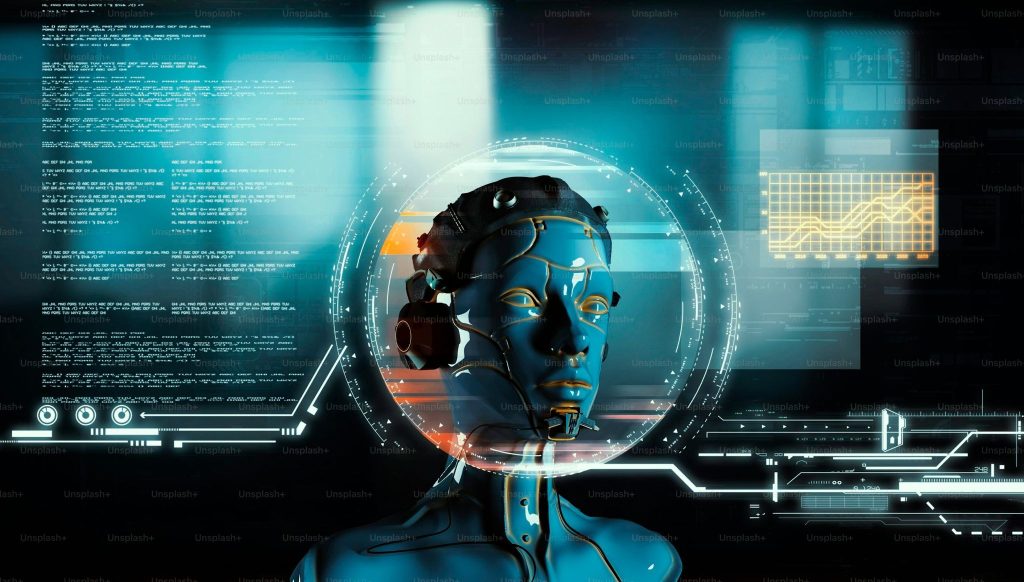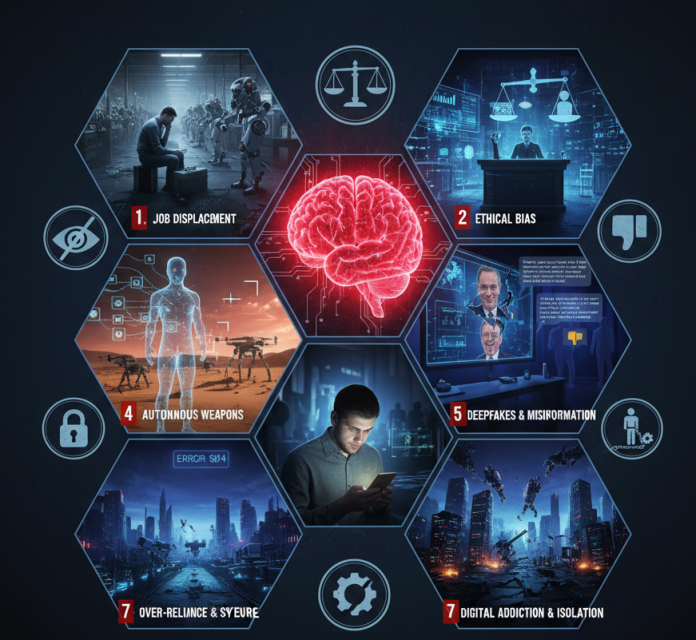Discover the 7 negative impacts of Artificial intelligence on jobs, privacy, security, and creativity you must know today.
The transformation of the world through Artificial Intelligence (AI) is at a rapid pace, which is unprecedented.
Artificial intelligence is present in nearly every aspect of human life, ranging from autonomous vehicles to digital helpers.
The advantages are huge, among them are higher productivity, new ideas, and an easier life, but at the same time, it still has great dangers.
Let’s uncover seven critical negative impacts that every user and business should be aware of.
1. Job Displacement: AI Replacing Human Roles
Artificial intelligence automation is cutting down on the number of workers in certain industries; nonetheless, the main issue with it is that it’s replacing human jobs in certain sectors.
Artificial intelligence has taken over performing routine, monotonous, and manual tasks in humans’ place because they are now cheaper and faster.

A World Economic Forum report indicates that by the year 2030, up to 83 million people employed may lose their jobs, and there will not be so many new roles to fill.
For example, if companies like Tesla and Amazon have integrated Artificial intelligence-powered robotics for packaging and manufacturing, significantly reduced human labor in warehouses.
This shift is especially visible in sectors like:
- Customer service (chatbots replacing human support)
- Transportation (autonomous vehicles)
- Finance (Artificial intelligence-based trading algorithms
2. Privacy Erosion: When Artificial Intelligence Knows Too Much
Vast data sets are analyzed by Artificial intelligence algorithms to predict behavior, track preferences, and influence decisions. If proper regulation is not in place, the data collection can be misused.
Example:
The Cambridge Analytica scandal exposed how Artificial intelligence-driven data analysis harvested millions of Facebook profiles to manipulate political campaigns, a wake-up call for global users.
Artificial intelligence invasion of privacy could become one of its biggest ethical challenges.
| Aspect | Artificial Intelligence Role | Risk |
| Social Media | Personalized feeds | Data profiling & manipulation |
| Smart Devices | Voice & activity tracking | Unauthorized surveillance |
| E-commerce | Purchase prediction | Behavioral tracking |
3. Bias in AI: The Unseen Prejudice
Bias manifests itself in several sectors, which include but are not limited to hiring, policing, facial recognition, and healthcare.
Algorithmic bias could mean that one gender, race, or social class would be, in fact, discriminated against unknowingly.
For example, we can see that Amazon had to shut down its recruitment tool after it showed bias against female candidates because historical data favored male employees.

These cases indicate that not capable of thinking; it picks up patterns, and when those patterns are wrong, the consequences turn out to be biased.
Ethical Artificial intelligence training, diverse datasets, and ongoing model audits are needed in organizations’ efforts to forestall this.
4. Overdependence on Artificial Intelligence Technology
It is a great help in making decisions, yet at the same time, it weakens people’s intelligence if used too much.
They are relying more and more on machines for thinking processes, from GPS navigation to AArtificial intelligence writing helpers.
This overreliance causes one’s capacity for creativity, decision-making, and problem-solving to gradually diminish.
Example:
Students increasingly use Artificial intelligence-based essay tools for assignments. While it saves time, it also reduces their ability to write critically and independently.
Over time, society may face a situation where AI dictates choices, and humans become passive followers, trusting automation over intuition.
5. Cybersecurity Threats Fueled by Artificial Intelligence
Strengthens cybersecurity, but it also empowers cybercriminals to develop smarter, undetectable attacks.
Hackers now use Artificial intelligence for deepfakes, phishing, and real-time identity manipulation.

| Artificial intelligence-Powered Threat | Impact on Users & Systems | Real-World Example |
| Deepfakes | Spreading misinformation, identity fraud | AI-generated fake videos of politicians |
| Voice Cloning | Financial scams, impersonation | $243K stolen using AI voice mimicry |
| AI Malware | Self-learning cyberattacks | Automated hacking bots |
Political opinions could be distorted by Artificial intelligence-generated deepfakes, or reputations could be tarnished, whereas phishing tools would be creating extremely believable scams.
6. Ethical Dilemmas and Moral Challenges in AI
It is capable of handling large amounts of data and making predictions based on them; nevertheless, it does not possess such traits as morality, empathy, or accountability.
This situation results in significant ethical problems in sectors where human lives are at stake and the decisions made can affect them.
Example: In self-driving cars, if an unavoidable crash occurs, who should save: the passenger or the pedestrian?
Without human morality, Artificial intelligence decisions can lead to life-altering consequences.
Governments and companies must therefore create Artificial intelligence ethics boards and transparent frameworks to ensure responsibility and fairness in decision-making.
7. Emotional Disconnection & Human Value
As artificial intelligence chatbots, virtual partners, and machines get more human-like, society faces a danger of emotional disconnection and inauthenticity.

Artificial intelligence friends may fill the gap of loneliness, but cannot substitute real empathy or warmth. Gradually, this may result in social isolation and fewer actual interactions.
For Example, in Japan, thousands of people interact daily with partners like Gatebox’s Azuma Hikari, showing how emotional dependency on machines can grow dangerously real.
Artificial intelligence may understand human emotions, but it can never feel them.
Conclusion – Building AI for a Better Future
Artificial intelligence has not been the enemy; rather, it has shown how humans treat it.

The seven detrimental effects signal the fact that Artificial intelligence, although it is the main supporter of progress, can also widen the gap, invade privacy.
The answer to this problem is the proper development of AI technology, making sure that every AArtificial intelligence system that we build has transparency, equity, and human control as its main characteristics.
The goal should be a future powered by Artificial intelligence that helps humans instead of taking away their place.
Empower yourself with awareness because how we use Artificial intelligence today will decide humanity’s tomorrow!!!
FAQs
1. Is Artificial intelligence replacing all human jobs?
No, but it’s changing job structures. Routine tasks are automated, pushing humans toward creative and analytical roles.
2. Why is Artificial intelligence considered a privacy threat?
Artificial intelligence collects personal data from digital activities. Without proper control, this data can be misused or sold.
3. How does bias occur in Artificial intelligence?
Bias arises when Artificial intelligence models train on unbalanced or discriminatory data, leading to unfair decisions.
4. Can Artificial intelligence be both ethical and powerful?
Yes — with transparent algorithms, diverse data, and ethical oversight, Artificial intelligence can remain fair and effective.
5. How can we use Artificial intelligence responsibly?
Educate users, regulate data collection, and encourage ethical Artificial intelligence policies across organizations.



